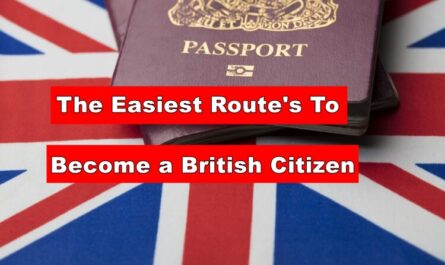In other to enter the United Kingdom seeking Marriage or a Job, you will need to go through the Visa process.
Relocating to the UK is a great decision if you are seeking a better life and want to try out a new country.
So if you want to see how to easily process your UK Visa and relocate to the UK in 2024, make sure you read till the end of this article.
In this guide, we’ll break down the process of obtaining a UK visa and relocating to the UK. From understanding the different visa types to gathering the necessary documents and navigating the application process, we’ll provide you with all the information you need to make your relocation dreams a reality.
Types of the UK Visas Available for Nigerians and South Africans
The UK offers various visa categories to accommodate different purposes. Some of the major visas for Nigerians looking to come to the UK include:
Adult Dependent Visa: For foreign nationals from Nigeria requiring care from their relatives in the UK.
Adult Student Visa: For students from Nigeria who want to study in the UK.
Business Visitor Visa: For business people from Nigeria traveling to the UK for up to six months for business activities.
Child Student Visa: For children from Nigeria between 4-17 years old to study in the UK.
Fiancé Visa: For fiancés from Nigeria of British Citizens or settled people.
Innovator Visa: For international entrepreneurs from Nigeria who invest £50,000 in a business in the UK.
Intra-Company Transfer Visa: For employees from Nigeria transferring to work in a UK branch.
Investor Visa: For international investors from Nigeria with a minimum of £2 million to invest in a UK business.
Minister of Religion Visa: Work permit for religious workers from Nigeria.
Paid Permitted Engagement Visa: Short-term entry for experts invited to the UK from Nigeria.
Skilled Worker Visa: For skilled workers from Nigeria with a job offer in the United Kingdom.
Sportsperson Visa: Work permit for sportspersons from Nigeria.
Spouse Visa: For spouses from Nigeria of British Citizens or settled people.
Startup Visa: For applicants from Nigeria who have approved sponsors to start their business in the UK.
Student Visitor Visa: For temporary study in the UK for students from Nigeria.
Temporary Worker Visa: For temporary workers from Nigeria in the UK for less than one year.
Tourist Visa: For visitors from Nigeria traveling to the UK for up to six months for leisure purposes.
Transit Visa: For passengers from Nigeria passing through the UK on their way to another country.
Two-year Post-study Work Visa: For international students from Nigeria who studied a bachelor’s or master’s course in the UK.
Unmarried Partner Visa: For long-term partners from Nigeria of British Citizens or settled people.
Youth Mobility Visa: A 2-year work permit for young people from Nigeria aged 18-30 (eligibility limited to certain countries).
UK Visa Requirements for Nigerians and South Africans
Nigerian citizens who wish to apply for a UK visa must fulfil certain criteria and provide specific documentation. The general requirements for UK visa applications from Nigeria include the following:
Valid Passport: Nigerians must possess a valid passport with at least six months of validity beyond the intended travel date.
Visa Application Form: Applicants must complete the online application form accurately and provide the required information.
Biometric Information: Nigerians are usually required to provide their biometric information, including fingerprints and a digital photograph, at a Visa Application Centre.
Proof of Purpose of Travel:
- Tourism: Provide details of the planned itinerary, accommodation arrangements, and evidence of sufficient funds for the trip.
- Study: Submit an acceptance letter from a recognised UK educational institution, evidence of tuition fee payment, and financial capacity to support studies.
- Work: Include a job offer letter from a UK employer with a valid sponsor license and evidence of necessary skills and qualifications.
- Family Visit: Provide an invitation letter from the UK-based family member and proof of their immigration status and relationship.
Financial Requirements: Demonstrate the ability to cover the cost of travel and stay in the UK by submitting bank statements, salary slips, or other financial documents.
English Language Proficiency: Depending on the visa category, Nigerians may need to provide evidence of their English language proficiency through recognised tests like IELTS or TOEFL.
Tuberculosis (TB) Test: In some cases, Nigerians may be required to undergo a tuberculosis test and provide the corresponding medical certificate.
Travel Insurance: It is advisable(not mandatory) to have travel insurance that covers medical expenses and other unforeseen circumstances during your stay in the UK.
Online UK Visa Application in Nigeria and South Africa
You must complete an online visa application form through the official UK government website (www.gov.uk). The form requires personal information, travel details, and other relevant information. You will also need to pay the visa fee online.
In addition to personal details, applicants must provide information about their travel plans. This includes specifying the purpose of the visit, the intended duration of stay, and the travel dates.
You may need to provide details about their accommodation arrangements, such as the address and contact information of where you will stay in the UK.
Once the online application form is completed and the visa fee is paid, you will receive a reference number or application ID, which should be kept for future reference.
How to Pay For UK Visa Fees in Nigeria and South Africa?
Select the type of visa you are applying for and check the associated fees. The fees vary depending on the visa category and duration of stay.
You can find the fee information on the UK Visa and Immigration website. It ranges from as £100 for Standard Visitor Visa for 6 months to as high as £837 for 10 year long-term Standard Visitor visa.
These fees do not include additional charges or the Immigration Health Surcharge for access to the UK’s National Health Service.
After completing the application form, you will be directed to the payment page. In Nigeria, you can pay the UK visa fees online using a debit or credit card.
Once the payment is made, print or save the receipt as a digital copy. You must provide proof of payment when attending the visa application centre or any further correspondence with the UK Visa and Immigration authorities.
Supporting Documents
You must submit supporting documents along with the application form to prove your eligibility. This step of the application is very significant in getting your application approved. Trust our team at IAS to help you do this accurately and efficiently.
The required documents vary depending on the visa type but generally include a valid passport, photographs, proof of accommodation, proof of financial means, and any specific documents related to the purpose of travel. Except for passports, all documents can be submitted as originals, scans, or photocopies.
What if One or More Documents to Be Submitted Are Not in English?
If you provide a document that is not in English or Welsh for your UK visa application, you must also include a complete translation. The translation should be done accurately and can be verified by the Home Office.
The translation should include a statement from the translator confirming its accuracy, the date of translation, the full name and signature of the translator, and their contact details.
Submitting Biometrics at UK Visa Application Center
Once the online application is completed and the visa fee is paid, you must schedule an appointment at the nearest Visa Application Center to submit your biometric information. This includes fingerprints and a digital photograph.
You will be given a scheduled date and time to bring along all the necessary documents, including your payment receipt.
Visa Interview
In some cases, applicants may be required to attend an interview at the Visa Application Center or the British High Commission in Abuja or Lagos.
The interview is conducted to assess the genuineness of the application. Be yourself and stay confident in the interview. Do not skip or hide any information there.
UK Visa Decision
After the application is processed, you will receive a decision on your visa application. If approved, the visa will be affixed to the passport or issued as an electronic visa. In case of refusal, you will receive a letter explaining the reasons for the refusal.
You can retrieve your passport and documents from the designated Visa Application Centre once it is ready for collection. The VAC will provide specific instructions on when and where you can collect your documents. You will receive a notification once it is available for pickup.
How to Proceed If a UK Visa is Refused?
In the unfortunate event that you encounter a UK visa refusal, it is important not to lose hope or feel the need to give up. You can contact us at IAS to get help dealing with your visa refusal. Our dedicated team will guide you through the entire process. There are three main courses of action you can undertake post-refusal.
If you believe your visa application or accompanying documents have been assessed inaccurately by the caseworker, thereby leading to your application’s refusal, you have the option to apply for an Administrative Review (AR).
This procedure only allows you to reference documents that have already been submitted. Adding new ones is not permitted in this process.
You have 28 calendar days to apply for the review beginning from the date stamped on the envelope.
UK Visa New Application
You may choose to submit a new visa application. This course of action allows you to rectify any mistakes from your previous application or add new supporting documents that were missing in the initial submission. You will have to pay the fee again.
Appeal A UK Visa Decision
In some cases, it might be possible to appeal the decision, especially when you believe your rights under the European Convention on Human Rights have been violated or the decision does not follow the immigration rules.
However, this is a lengthy process and consulting an experienced immigration service like IAS is very helpful when choosing this route.
Regardless of the path you choose, it’s important to fully understand why your application was refused in the first place. This way, you can effectively address the issues and hopefully succeed in your next attempt.
Common Reasons for UK Visa Refusal in Nigeria and South Africa
You must be aware of the common reasons for visa refusal. Understanding these reasons can help you prepare a strong application that addresses potential concerns and increases your chances of a successful outcome.
- Applying for the Wrong Type of Visa
If you apply for a visa that doesn’t align with the purpose of your visit or contradicts your intended activities in the UK, it can lead to a visa refusal.
- Insufficient or Lack of Supporting Evidence
Failing to provide proper documentation or evidence to support the information provided in your visa application can result in a refusal. This includes documents related to your employment, financial situation, accommodation, and travel plans.
- Failure to Mention Family in the UK or Provide Contradictory Information
If you have close family members in the UK and fail to mention them in your application or provide contradictory information about your family ties, it may raise concerns about your intentions or credibility, potentially leading to a visa refusal.
- Exaggerated Periods of Stay or Inconsistent Travel History
Providing unrealistic or exaggerated periods of stay in the UK or having an inconsistent travel history may raise doubts about your intentions to abide by the visa rules and return to your home country, which can result in a visa refusal.
- Financial Inability to Support Yourself
If you cannot demonstrate sufficient funds to cover your expenses during your stay in the UK, it can lead to a visa refusal. You should provide evidence of your financial status, such as bank statements, payslips, or sponsorship letters, to prove your ability to support yourself.
- The Inability of Your Sponsor to Support You
Having a sponsor providing financial support for your visit to the UK, but cannot demonstrate adequate financial capacity or provide supporting documents may lead to a visa refusal.
Conclusion
Processing your UK visa may seem like a daunting task, but with careful planning and preparation, it can be a straightforward and rewarding experience. By understanding the different visa types, gathering all required documents, submitting your application accurately, attending your biometrics appointment, and preparing for your trip, you’ll be well on your way to exploring all that the UK has to offer, follow this comprehensive guide to make your UK visa journey a success. Safe travels!


